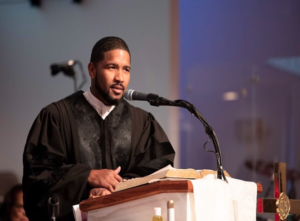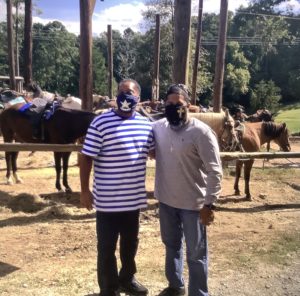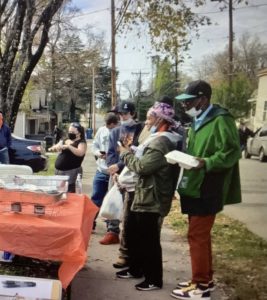 At the start of the COVID-19 pandemic, Rev. Dr. Louis Threatt – a prison chaplain who never saw himself as a congregational pastor – launched Cities of Refuge Christian Church (DOC), a faith community for incarcerated people to meet an ironic gap in Christian ministry.
At the start of the COVID-19 pandemic, Rev. Dr. Louis Threatt – a prison chaplain who never saw himself as a congregational pastor – launched Cities of Refuge Christian Church (DOC), a faith community for incarcerated people to meet an ironic gap in Christian ministry.
Despite Matthew 25’s directive, he says, the church is one of the most difficult places for incarcerated people and their families to find acceptance.
Rev. Threatt considers himself part of this community. A close friend and a handful of immediate family members have been incarcerated, including a sister, who is now out and doing well.
“I can never fully understand the experience of somebody who has been incarcerated,” he says. “But I know what it’s like writing to somebody who’s locked up, visiting them, talking to someone through a glass window, wondering when you can see them on the outside. And I know the joy when they’re released.”
When a formerly incarcerated person enters a church, he says that even an introduction of who they are can be uncomfortable. Do they reveal they are formerly incarcerated and lead with the past, or wait for someone to find out and then judge them, or accuse them of hiding something?
“There are many ‘cities of refuge’ that focus on those who have been pushed to the margins, like those in the LGBTQ community,” Rev. Louis says. “But you rarely see any that serve the groups scripture specifically talks about.” (Matthew 25: naked, hungry, and imprisoned)
Cities of Refuge Church’s congregants include people who have been incarcerated, those who have been impacted by incarceration, and others who are passionate about the work that is happening.
 Worship always includes time for celebration. One choir member celebrated the removal of his ankle bracelet and release from his curfew. Another member, who had been released from a life sentence after 29 years in prison, celebrated receiving a driver’s license and insurance.
Worship always includes time for celebration. One choir member celebrated the removal of his ankle bracelet and release from his curfew. Another member, who had been released from a life sentence after 29 years in prison, celebrated receiving a driver’s license and insurance.
“These brothers are putting everything on the table, keeping us on track with what they are doing,” explains Rev. Louis. “So, we put our hands together to celebrate these wonderful accomplishments. Getting a driver’s license might seem like a small achievement, but this is huge for him – and us.”
Rev. Louis tells us that strong support systems, like families and religious groups, help decrease recidivism rates for his brothers and sisters at Cities of Refuge.
He hopes that COR can lead by example to change the narrative regarding the church supporting those impacted by incarceration, helping them reintegrate into society without feeling ashamed or scrutinized but supported in every way – especially because of the overwhelming racial bias of the prison system.
“Witnessing the vast number of persons of color inside, especially as an African American man, has been challenging,” the pastor says.
The United States has the world’s highest incarceration rates, in absolute numbers and per capita, reflecting a 7-fold increase to 2.3 million since 1970 – far ahead of population growth and crime, according to the ACLU. “One out of every three Black boys born today can expect to go to prison in his lifetime,” an ACLU report says, “as can one of every six Latino boys — compared with one of every 17 white boys. Black people are also subject to pretrial detention at a higher rate than white arrestees with similar charges and history.”
 While society and systems may discriminate, the church has no place in that process.
While society and systems may discriminate, the church has no place in that process.
“How can we pick and choose who we invite into the church?” Rev. Louis questions. “I don’t believe that’s the God we serve. That’s not Jesus. In fact, many forget that Jesus was an inmate.”
Your gifts to Disciples Church Extension Fund’s New Ways into the World endowment campaign help innovative new faith communities thrive. Choose from various ways to give.

